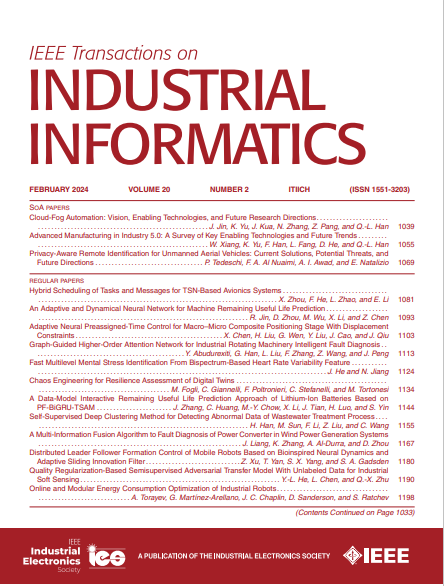Filter-Match-Interact Transfer Framework for Machineries Open-Set Fault Diagnosis
IF 9.9
1区 计算机科学
Q1 AUTOMATION & CONTROL SYSTEMS
引用次数: 0
Abstract
The available labeled samples are scarce when high-end machineries work in different operating-load conditions. There are often new faults present when conducting transfer fault diagnosis, leading to performance degradation. How to accurately identify them under dynamic load-variable conditions is a more challenging issue. Therefore, the filter-match-interact transfer framework (FMI-TF) is proposed, which consists of three interactive networks. Open samples filtering: learn the known–unknown samples classification hyperplane by designing the progressive filtering discriminator, achieving target samples distraction and progressive outliers filtering. Weighted auxiliary matching: align domain distributions and tighten known–unknown samples boundary through the entropy-modified weighted matching mechanism, the auxiliary distracting classifier, and the high-confidence negative probabilities of unknown samples. Interactive refinement rectification: mine and cultivate information interaction and coupling within two networks by improving the differentiated interactive updating module, and achieving positive network transfer. The FMI-TF has been validated on different mechanical testbeds.用于机器开放集故障诊断的过滤器-匹配-交互传输框架
当高端机械在不同的工作负荷条件下工作时,可用的标签样品很少。在进行传输故障诊断时,往往会出现新的故障,导致性能下降。如何在动态载荷变化条件下准确识别它们是一个更具挑战性的问题。为此,提出了滤波器-匹配-交互传输框架(FMI-TF),该框架由三个交互网络组成。开放样本滤波:通过设计渐进式滤波鉴别器,学习已知-未知样本分类超平面,实现目标样本分散和渐进式离群值滤波。加权辅助匹配:通过熵修正加权匹配机制、辅助分散分类器和未知样本的高置信度负概率,对齐域分布,收紧已知-未知样本边界。交互精细化整改:通过改进差异化交互更新模块,挖掘和培育两个网络内的信息交互和耦合,实现正向网络传递。FMI-TF已在不同的机械试验台上进行了验证。
本文章由计算机程序翻译,如有差异,请以英文原文为准。
求助全文
约1分钟内获得全文
求助全文
来源期刊

IEEE Transactions on Industrial Informatics
工程技术-工程:工业
CiteScore
24.10
自引率
8.90%
发文量
1202
审稿时长
5.1 months
期刊介绍:
The IEEE Transactions on Industrial Informatics is a multidisciplinary journal dedicated to publishing technical papers that connect theory with practical applications of informatics in industrial settings. It focuses on the utilization of information in intelligent, distributed, and agile industrial automation and control systems. The scope includes topics such as knowledge-based and AI-enhanced automation, intelligent computer control systems, flexible and collaborative manufacturing, industrial informatics in software-defined vehicles and robotics, computer vision, industrial cyber-physical and industrial IoT systems, real-time and networked embedded systems, security in industrial processes, industrial communications, systems interoperability, and human-machine interaction.
 求助内容:
求助内容: 应助结果提醒方式:
应助结果提醒方式:


